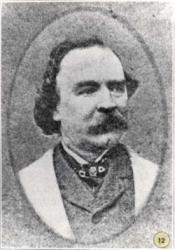1830 - 1887 Person Name: E. G. T. Composer of "[Just as I am, without one plea]" in Our Song Book Taylor, Edward G. (Fox Chase, Philadelphia, Pennsylvania, November 25, 1830--April 10, 1887, Buffalo, New York). University of Lewisburgh, 1854; Rochester Theological Seminary, 1856. Pastorates at Terre Haute, Indiana, 1857-1860; Cincinnati, Ohio, 1860-1864; Chicago, Illinois, 1864-1870; New Orleans, Louisiana, 1870-1875; Providence, Rhode Island, 1875-1881; New York, 1881-1882; Newark, New Jersey, ?; Buffalo, N.Y., 1885-1887.
Taylor was the author of a large number of hymns for use in Sunday schools. In the Service of Song for Social Meetings (1881) is one of his hymns that begins "Deal kindly with my master," with music by George W. Stebbins. Stebbins also composed music for Taylor's "Not saved are we by trying."
For most of his hymns, Taylor composed the music as well as the words. Among these are the following:
Able to save the uttermost is he
All my trust is in Thee, Jesus
Arise and be doing, the Lord be with Thee
Calleth the Savior in tones of love
Glad the ransomed of Jehovah
O Lord from thy dwelling place hear our hearts say
One thing I know, I was blind but now see
Serve the Lord with willing mind
Thank God for the Bible, more precious than gold
The happy morn has dawned at last
Trust him sinner, trust him now
Why sit we here until we die
Wine is a mocker, and strong drink is raging
One hymn is a rendering into verse of Samuel 2:9, "At the King's table the kindness of God."
--Alan Wingard, DNAH Archives
Edward G. Taylor


 My Starred Hymns
My Starred Hymns


